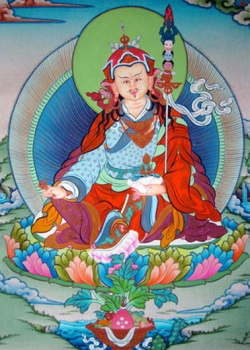Guru Rinpoche Tsog
Today is the auspicious day of Guru Rinpoche.
Guru Rinpoche performed many great events and all of these great events were performed on the 10th day of the lunar month, which is today.
This is the reason all the monasteries that adhere to the Nyingma tradition of Tibetan Buddhism perform the tsog offering to Guru Rinpoche.
The tsog offering is a cycle of accumulation of merit.
All sentient beings wander in the realms of samsara due to ignorance, karmic formation, and misery. Cyclic existence should be understood as uninterrupted.
In the mind stream of each individual, these conflicting emotions manifest incessantly.
Based on the continuous occurrence of conflicting emotions, sentient beings commit wholesome and unwholesome acts.
Because of this, sentient beings alternately experience the state of happiness and the state of misery.
But the term “cycle” in the context of tsog offering should not be understood in terms of samsaric cycles.
Here, the term “cycle” should be understood in terms of an incessant experience of the wisdom state based on the practice of transformation from confusion to wisdom.
Tsog offering enables each individual to obtain the luminosity of the wise mind.
To do this, it is important to accumulate merit.
This practice should be conjoined with purification of one’s being.
One should also rely on the blessing that comes from a realized guru or master. If one were to use other methods, they would be limited.
One cannot attain realization of emptiness even if one is very powerful, wealthy, or beautiful.
Hence, it is difficult to realize the meaning of emptiness by one’s material wealth, or prosperity.
Similarly, if one is very learned it is questionable whether one would be able to realize the profound meaning of emptiness.
It also goes without saying that someone who is completely ignorant or confused has no chance either.
One should therefore understand that the three methods, to accumulate merit, purify one’s being, and rely on the blessings from a realized guru, are the methods that will enable us to obtain the profound meaning of emptiness.
These three methods are found within the single practice of tsog offering.
For those of you who are associated with the vajrayana practice, it is important to undertake the practice of tsog offering on the 10th or the 25th of the lunar month.
During the practice, it is important to adopt the view that transcends hope and fear, and one’s conduct should be beyond the polarities of positive or negative.
The practice is also beyond cleanliness and filthiness. It is essential to realize that the mandala of the meditation deities is inseparable from the mandala of one’s own body.
Based on this, one partakes in the offering of the tsog without any separation between oneself and the meditation deities that are found in the mandala.
In the vajrayana tradition of the tsog practice, one can also offer songs and dances. It is also said that alcohol and meat are essential ingredients of the practice.
Most practitioners combine the sutra and the tantra where there is not much emphasis on songs and dances.
In Tibet, most practitioners eat meat, but in ancient India, those who consumed alcohol and meat were classified as belonging to a very inferior caste, and those who were vegetarians, the Brahmins, were belonging to the highest caste.
There was a strict separation between the castes, and if the shadow of a low caste person fell on a high caste, person the high caste would feel very filthy.
This practice of tsog offering does away with the notions of cleanliness and filthiness.
When we talk about something being pure and something being impure, it comes down to one’s conceptual mind. Everything is decided by one’s concept.
Now, try to conceptualize that everything you experience at this moment is infinitely pure.
If you generate disturbing emotions in this process, don’t regard them as impure or negative.
Even if you generate positive emotions, do not be overjoyed. While experiencing either positive or negative emotions, simply observe their very essence. If you can do so, that motion will dissolve.
During the practice of tsog, you should try to relax your body and mind.
You should relax your body and speech. Sit naturally in a way that is comfortable for you.
When you are singing the prayers, sing naturally. Releasing your body and speech will bring you closer to the experience of fundamental wisdom.
Oslo, June 2005
Translated by Lama Changchub at Karma Tashi Ling Buddhist Centre, Norway

